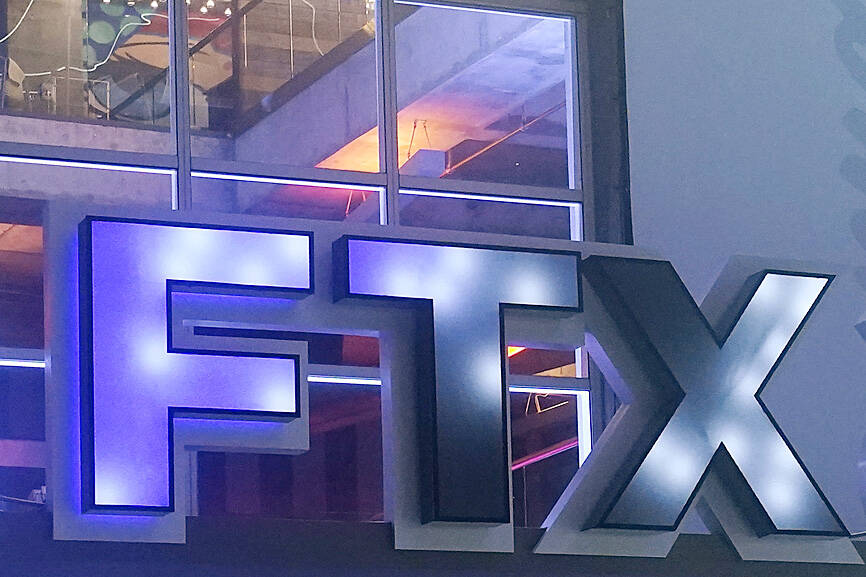The company tasked with locking down the assets of the failed cryptocurrency exchange FTX has said it has recovered and secured US$740 million in assets so far, a fraction of the potentially billions of US dollars likely missing from the company’s coffers.
The numbers were disclosed on Wednesday in court filings by FTX, which hired the cryptocurrency custodial company BitGo hours after FTX filed for bankruptcy on Nov. 11.
The biggest worry for many of FTX’s customers is that they could never see their money again.

Photo: AP
FTX failed because its founder and former chief executive officer Sam Bankman-Fried and his lieutenants used customer assets to make bets in FTX’s closely-related trading firm, Alameda Research.
Bankman-Fried was reportedly looking for more than US$8 billion from new investors to repair the company’s balance sheet.
Bankman-Fried “proved that there is no such thing as a ‘safe’ conflict of interest,” BitGo chief executive officer Mike Belshe said in an e-mail.
The US$740 million figure is from Wednesday last week. BitGo has estimated that the amount of recovered and secured assets has likely risen to more than US$1 billion since then.
The assets recovered by BitGo are locked in South Dakota in what is known as “cold storage” — cryptocurrencies stored on hard drives not connected to the Internet.
BitGo provides “qualified custodian” services under South Dakota law. It is the crypto equivalent of a financial fiduciary, offering segregated accounts and other security services to lock down digital assets.
Several crypto companies have failed this year, as bitcoin and other digital currencies have collapsed in value.
FTX failed when it experienced the crypto equivalent of a bank run, and early investigations have found that FTX employees intermingled assets held for customers with assets they were investing.
“Trading, financing and custody need to be different,” Belshe said.
The assets recovered include not only bitcoin and ethereum, but also a collection of minor cryptocurrencies that vary in popularity and value, such as the Shiba Inu coin.
California-based BitGo has a history of recovering and securing assets. The company was tasked with securing assets after the cryptocurrency exchange Mt. Gox failed in 2014. It is also the custodian for the assets held by the government of El Salvador as part of that country’s experiment in using bitcoin as legal tender.
FTX is paying BitGo a US$5 million retainer and US$100,000 per month for its services.

POWERING UP: PSUs for AI servers made up about 50% of Delta’s total server PSU revenue during the first three quarters of last year, the company said Power supply and electronic components maker Delta Electronics Inc (台達電) reported record-high revenue of NT$161.61 billion (US$5.11 billion) for last quarter and said it remains positive about this quarter. Last quarter’s figure was up 7.6 percent from the previous quarter and 41.51 percent higher than a year earlier, and largely in line with Yuanta Securities Investment Consulting Co’s (元大投顧) forecast of NT$160 billion. Delta’s annual revenue last year rose 31.76 percent year-on-year to NT$554.89 billion, also a record high for the company. Its strong performance reflected continued demand for high-performance power solutions and advanced liquid-cooling products used in artificial intelligence (AI) data centers,

SIZE MATTERS: TSMC started phasing out 8-inch wafer production last year, while Samsung is more aggressively retiring 8-inch capacity, TrendForce said Chipmakers are expected to raise prices of 8-inch wafers by up to 20 percent this year on concern over supply constraints as major contract chipmakers Taiwan Semiconductor Manufacturing Co (TSMC, 台積電) and Samsung Electronics Co gradually retire less advanced wafer capacity, TrendForce Corp (集邦科技) said yesterday. It is the first significant across-the-board price hike since a global semiconductor correction in 2023, the Taipei-based market researcher said in a report. Global 8-inch wafer capacity slid 0.3 percent year-on-year last year, although 8-inch wafer prices still hovered at relatively stable levels throughout the year, TrendForce said. The downward trend is expected to continue this year,

Vincent Wei led fellow Singaporean farmers around an empty Malaysian plot, laying out plans for a greenhouse and rows of leafy vegetables. What he pitched was not just space for crops, but a lifeline for growers struggling to make ends meet in a city-state with high prices and little vacant land. The future agriculture hub is part of a joint special economic zone launched last year by the two neighbors, expected to cost US$123 million and produce 10,000 tonnes of fresh produce annually. It is attracting Singaporean farmers with promises of cheaper land, labor and energy just over the border.

US actor Matthew McConaughey has filed recordings of his image and voice with US patent authorities to protect them from unauthorized usage by artificial intelligence (AI) platforms, a representative said earlier this week. Several video clips and audio recordings were registered by the commercial arm of the Just Keep Livin’ Foundation, a non-profit created by the Oscar-winning actor and his wife, Camila, according to the US Patent and Trademark Office database. Many artists are increasingly concerned about the uncontrolled use of their image via generative AI since the rollout of ChatGPT and other AI-powered tools. Several US states have adopted